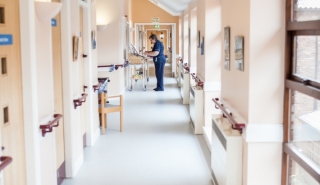In this section
NHS hospital volunteers: celebrating 40 years of National Volunteers’ Week
03 June 2024
This year’s National Volunteers’ Week is a chance to say a heartfelt thank you to volunteers who give their time in hospitals.
National Volunteers’ Week, which takes place from Monday 3 June until Sunday 9 June, marks 40 years since it was launched nationally in the UK. Back in 1984, it was known as Volunteering England. Today, 8.3 million people are involved in volunteering each week.
During the week, NHS staff at York and Scarborough Teaching Hospitals NHS Foundation Trust will be applauding their 200+ volunteers for their incredible efforts. The 40th anniversary allows volunteers and staff time to reflect on volunteer achievements during the special milestone week and provides an opportunity to give thanks to the hospital’s volunteering community.
Interim Chief Nurse, Dawn Parkes, said: “I want to say a massive thank you to all those involved with our volunteering services. The contribution they make to our Trust, for our patients, and our service users is phenomenal and really helps us deliver the best care we can.”
Diane Benson, Volunteer Services Manager, explained: “Volunteers’ Week is an important opportunity to shine a light on our incredible volunteers who support our patients, staff, and visitors across the Trust. They give their time freely as a gift and bring a range of experience and commitment to their roles. They are very much a part of our team and make a significant difference in our hospitals. Their kindness, care, and compassion do not go unnoticed.”
Volunteers can be found throughout the Trust from the Outpatient Department to the Eye Clinic, and from the Emergency Department to Chaplaincy.
Tom Dixon, of Bridlington, decided he wanted to become an NHS volunteer during the pandemic. His volunteering efforts resulted in the offer of a permanent contract as a healthcare worker.
Tom described how much staff have helped launch his career. He said: “I wouldn't have been able to continue with my career without the staff’s help. The volunteer-to-career scheme in the NHS makes that chance of becoming a healthcare professional possible. The best part was knowing every time I stepped on the ward I was needed. I tried to make a patient’s experience better by being an activity volunteer. I have made so many friends. The skills gained didn't just help me throughout my volunteer role, it helped with everyday basic life skills.”
Graham Walker, a volunteer at York Hospital’s Emergency Department, said: “Volunteering is an amazing experience to learn new skills, gain new experiences, and to be able to help people in the real world, with real issues, in a positive way. I have found the work to be extremely rewarding and it is probably the best thing I've done in 30 years.”
Student Clio Hall described her volunteering as “the most rewarding experience of her life”. She said: “I have made incredible relationships with both staff and patients, and I am equally as grateful for them as they say they are for me.”
Eric Truman volunteers at Scarborough Hospital and is a face that many visitors, patients, and staff will recognise. Eric worked in central stores up until he retired six years ago. He decided he would become a ‘Meet and Greet Volunteer’ to help direct people where to go.
“If it hadn't been for the NHS l probably wouldn't be here today so it’s my way of giving back,” Eric explained, “what l do enjoy about the volunteer role is meeting people, helping and reassuring them, and getting them to appointments.”
Whatever your motivation, the Trust’s volunteering team want to hear from you. Please visit our website for more details and find out how you can express your interest in volunteering in our hospitals.






